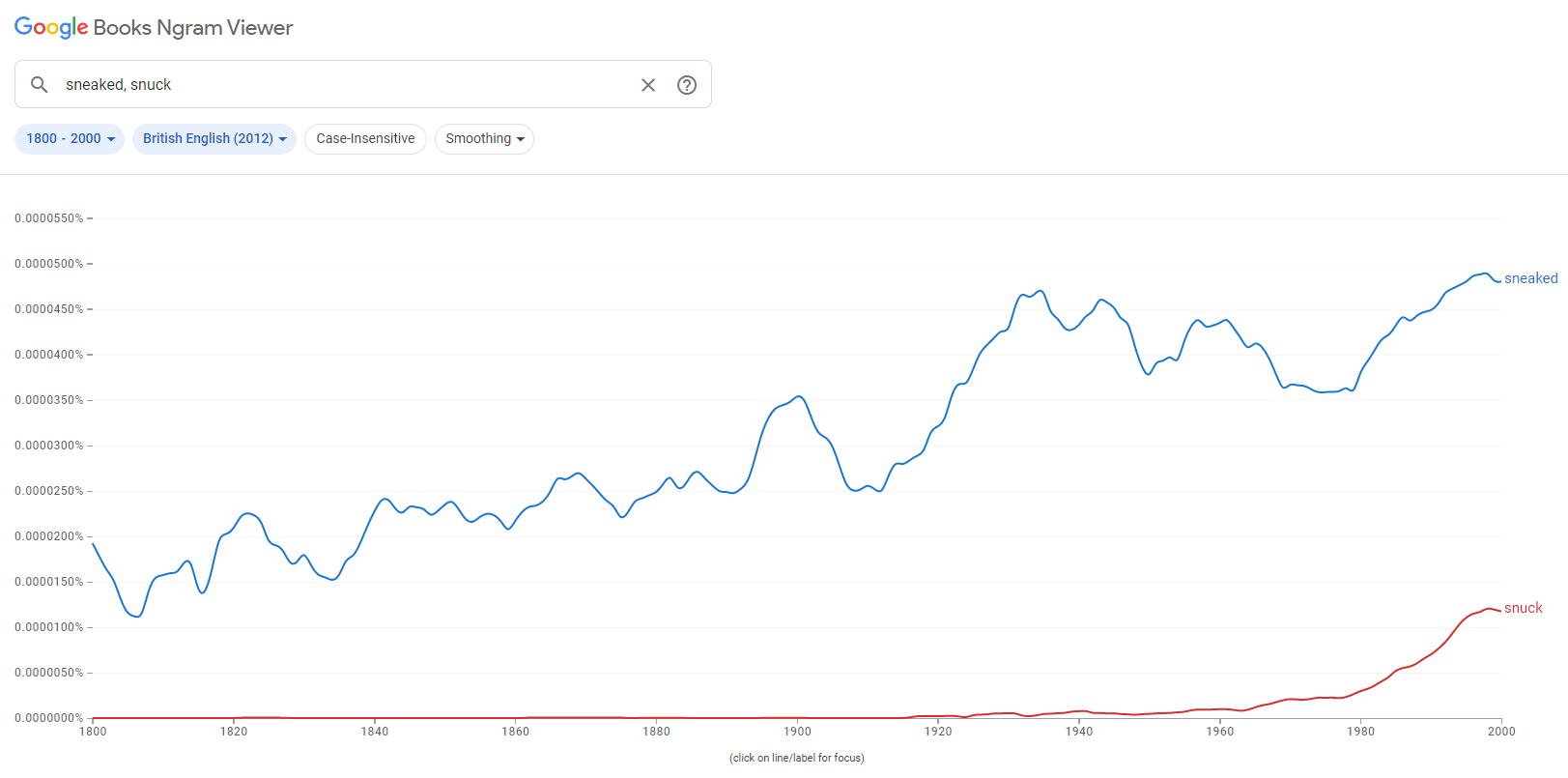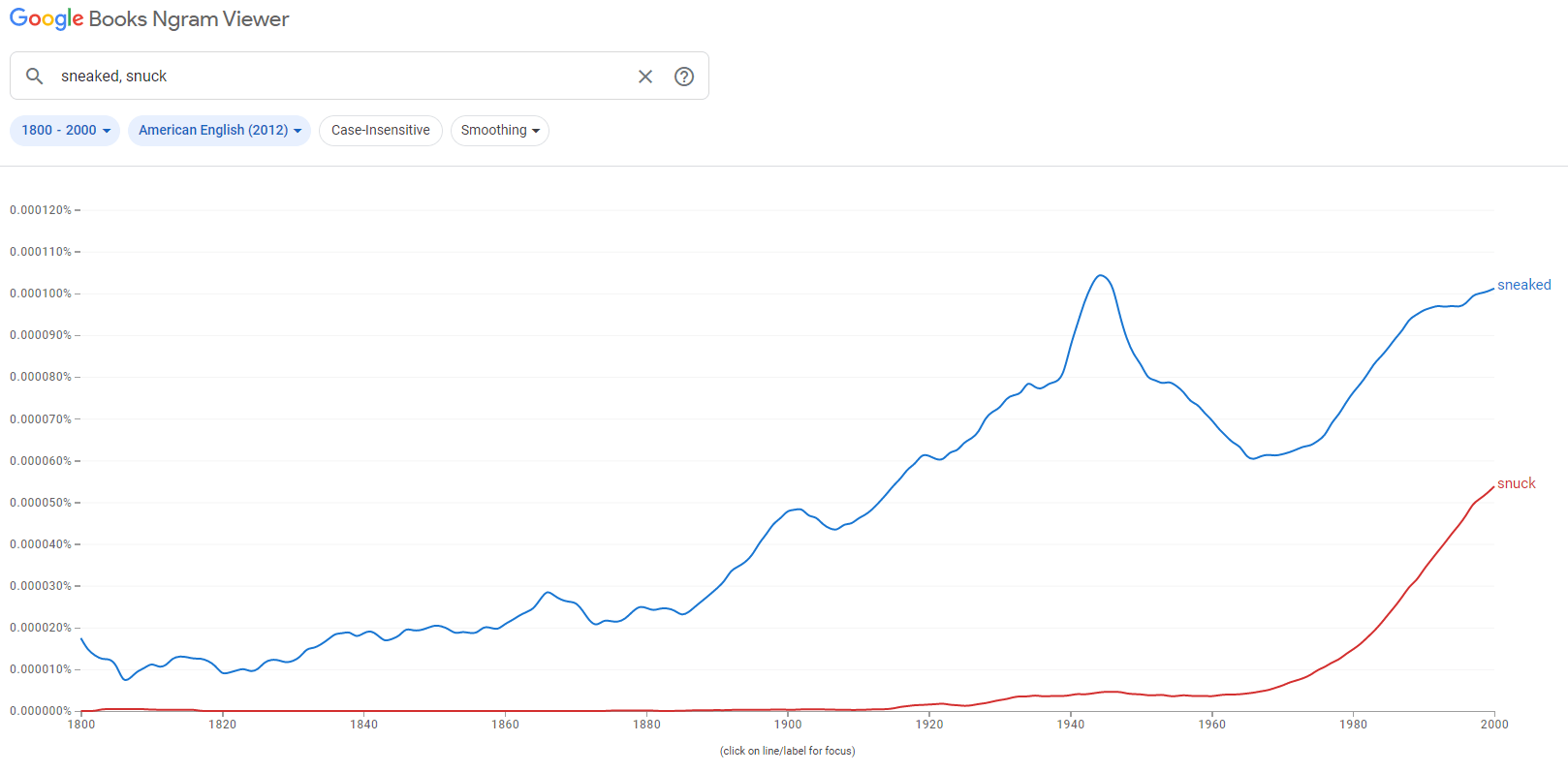A listener named Salomé from Santa Clara, California, wrote,
“I have a question regarding the word ‘sneaked’ versus ‘snuck.’ I religiously hammer into my students’ heads that ‘snuck’ is not a word, but I hear it used all the time (in public speaking and in the media). My students have even noted the instances and have asked me to explain. [Can you help?]”
Salomé is right that “sneaked” has been considered the proper form of the word for a long time, but she and her students are also on to something when they notice people using “snuck” out in the world.
‘Snuck’ Is Becoming More Popular
The previous edition of Garner’s Modern American Usage put “snuck” for “sneaked” at stage 3 on his language change index (which means it was widespread but still avoided in careful usage), but the most current edition, published in 2016, puts it at stage 4 (which means it’s now ubiquitous but still objected to on cogent grounds by a few die-hard snoots, as he puts it), so as people have been predicting and noticing for a while, “snuck” is becoming more popular, especially in American English.
‘Snuck’ Is More Popular in the United States
And this is definitely more of an American thing than a British thing. “Snuck” first appeared in American English in the late 1800s, but it wasn’t until about 1970 that it started really gaining popularity in both Britain and the United States. But it’s still used much more often by Americans than the British, which you can see in graphs from the Google Book corpus.
‘Snuck’ in British English
‘Snuck’ in American English
‘Sneaked’ and ‘Snuck’ on TV
The popularity of “snuck” stands out even more in the BYU TV Corpus, which is a database you can search that has words from 75,000 TV episodes from the 1950s to today. It gives you more of an idea of what’s popular or common in informal English as compared to looking at what gets published in Google books. And “snuck” is dramatically more popular than “sneaked” on TV. There were more than 2,200 instances of “snuck,” but only 251 of “sneaked.” And the change over time is also dramatic.
If you want your characters to sound authentic, you may want to use ‘snuck.’
The last time “sneaked” showed up at all in the TV database was in 2005. But the use of “snuck” has grown every decade since the 1960s and had more than half its uses from 2010 onward. “Snuck” is just killing “sneaked” on TV, and it’s only growing in popularity. And again, that seems to be American TV. Australian and New Zealand TV usage seems to be about the same as the U.S. usage—“snuck” is a tiny bit less popular there—but “snuck” is dramatically less popular on British TV. The Brits seem to be sticking with “sneaked.”
‘Snuck’ Is Bucking Language Change Trends
One thing that’s especially interesting about the way this verb is changing is that it’s going from being a regular verb to an irregular verb.
The past tense form of regular verbs end with “-ed.” They’re verbs like “walked,” “cheered,” and “rotated.”
Instead of adding “-ed” to the end, irregular verbs have a whole different spelling for their past tense. They’re verbs like “went” for the past tense of “go,” “ran” for the past tense of “run,” and “drank” for the past tense of “drink.”
We all like patterns, and conventional wisdom says that English verbs tend to become regular over time. For example, when you’re talking about chiding someone in the past, scolding them, we used to say we “chode” them, but now we say we “chided” them. That’s a verb that became regular. We now make it past tense by putting “-ed” on the end. But “sneak” is doing the opposite. It’s getting its own different past-tense spelling, becoming irregular, and nobody seems to know why. It’s just interesting.
‘Snuck’ is a word just like ‘chided’ is a word.
When to Use ‘Sneaked’ and ‘Snuck’
So, what should you do?
Well, “snuck” is most definitely a word. Things change, and “snuck” is a word just like “chided” is a word.
If you’re British, it’s easier. You should probably just stick with “sneaked.”
If you’re American, you may want to put more thought into what you’re writing. If it’s something more academic or formal, maybe stick with “sneaked,” but if you’re writing a TV or movie script or a novel and you want your characters to feel authentic and sound how people really talk, you should feel free to use “snuck.”






